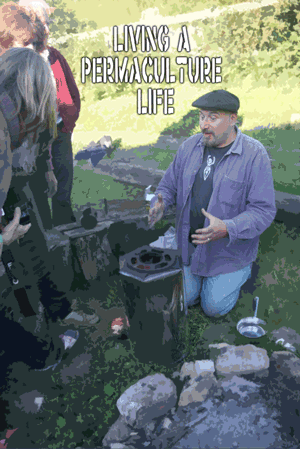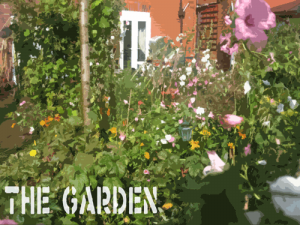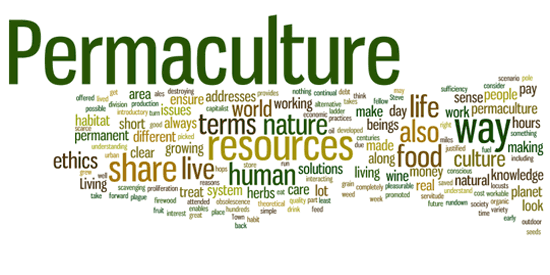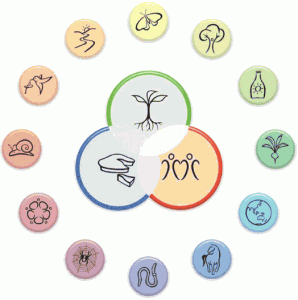People arrive at Permaculture for a variety of different reasons, my interest really developed out of the alternative culture of the early 1990s, where I was attempting my own brand of urban scavenging and self sufficiency with backyard organic food production, wine making, and growing a little outdoor weed, when I first read bits of Permaculture 1 and attended a short lived introductory course in 1996, it was very clear to me that Permaculture was a way forward to me, that provided interlinked workable solutions, and it also promoted tinkering and experimentation which is something that I’ve always done due to being short of money.
Permaculture addresses issues and provides solutions
 For me Permaculture addresses the fundamental issues of human life that have been the subject of centuries of wars and division supported and justified by spurious Philosophies that exist in a theoretical vacuum thousands of miles away from the real day to day life of human beings living and working in their habitat. Permaculture takes philosophy right back to the basics of being a conscious human being within their habitat, by looking at how we treat the planet that is our home, how we treat each other, and how we share out that which we take from nature in the form of resources.
For me Permaculture addresses the fundamental issues of human life that have been the subject of centuries of wars and division supported and justified by spurious Philosophies that exist in a theoretical vacuum thousands of miles away from the real day to day life of human beings living and working in their habitat. Permaculture takes philosophy right back to the basics of being a conscious human being within their habitat, by looking at how we treat the planet that is our home, how we treat each other, and how we share out that which we take from nature in the form of resources.
Permaculture ethics
The ethics of permaculture are crystal clear, we care for the planet that sustains all life by getting to know nature again and understanding her language, we care for and look after our fellow human beings and they in turn look after us, and we ensure that people get a share of the resources that we gather from nature, whilst at the same time ensuring that place limitations to ensure that we don’t decimate the world in a plague of locusts scenario. These ethics are simple to understand, they work very well together, with each ethic feeding the other, they make an awful lot of sense, and they contain the potential to create a completely different world to that which we are living in and destroying.
Living the Permaculture way
Living the Permaculture way in a modern capitalist society goes against the grain of debt, built in obsolescence, continual economic growth, and a work life of 40 hours per week servitude. It’s all about thinking locally, and what you can you do in the area where you live, for me is has been growing food, and other resources, including firewood, tobacco, medicinal herbs, and fruit and hops for wine and beer making, its not only been very pleasurable doing it, but also saved me hundreds of hours that I would spent working for money to pay for the stuff I grew and  made. Having access to and generating these natural resources has also meant I’ve been able to plant trees flowers and herbs in and around the area where I live at no cost. I always share some of my produce, share seeds, and share any skills that I may have picked up along the way. As part of trying to live the Permaculture way I have made it a habit to show at least one person how to do and make things along the way, its all about sharing knowledge in terms of its proliferation. Something to also consider, I live in a Council house in a small rundown Northern Town, and despite not having a good income there is a lot that people can achieve lower down the greasy pole of the social class ladder, I eat great food, pay nothing for fuel and drink wines and ales that would probably be described as artisan in terms of their quality.
made. Having access to and generating these natural resources has also meant I’ve been able to plant trees flowers and herbs in and around the area where I live at no cost. I always share some of my produce, share seeds, and share any skills that I may have picked up along the way. As part of trying to live the Permaculture way I have made it a habit to show at least one person how to do and make things along the way, its all about sharing knowledge in terms of its proliferation. Something to also consider, I live in a Council house in a small rundown Northern Town, and despite not having a good income there is a lot that people can achieve lower down the greasy pole of the social class ladder, I eat great food, pay nothing for fuel and drink wines and ales that would probably be described as artisan in terms of their quality.
For a permanent culture
I cannot think of another system of interacting with our natural world where a synergy is possible between ourselves and the nature, and producing resources that are in a very real sense sustainable in terms of minimizing the damage of our fragile Eco-systems than that which is offered by Permaculture. As a design system and series of ideas and practices Permaculture has the tools, the blueprint and the knowledge store for bringing about a permanent culture. In terms of the future of food, It will be permaculture that enables humanity to feed itself after the oil has run out and other highly scarce resources are at the point of depletion.
Steve


